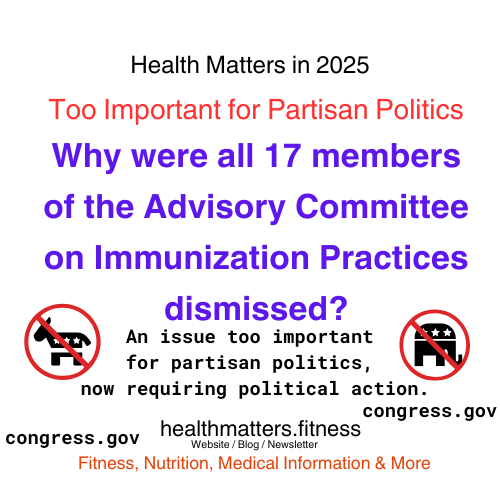Why were all 17 members of the Advisory Committee on Immunization Practices dismissed?

Before we dive into this question, I want to discuss the notion of “being political.” Health and medical professionals are often labeled as “being political” when we voice our concerns. However, when politicians, political commentators, media figures, or other social influencers make inaccurate statements or engage in troubling actions, it is our responsibility to speak out—if we don’t, who will? I have been reluctant to name specific individuals in the political arena, but it has become essential to do so. This problem should not be viewed through a partisan lens; we will all face the consequences – and we all can be a part of the solution.
In June, the Secretary of Health and Human Services abruptly dismissed all 17 members of the Advisory Committee on Immunization Practices.
Over 100 health and medical organizations responded by demanding an immediate reversal of this action. Countless scientist as well as health and medical professionals have spoken out in opposition.
In an attempt to justify his actions, the HHS Secretary claimed the committee had conflicts of interest.
ACIP members, who annually file financial disclosures, are required to divest all vaccine manufacturer stock before they join, as are their family members. They must quit service on any vaccine company scientific advisory board. They cannot continue consulting for vaccine companies. ACIP members may not serve as expert witnesses in vaccine litigation. They can’t accept travel or food from vaccine companies or hold patents or collect patent royalties on any vaccine product or process. Their family members can’t work for vaccine companies. Possible conflicts of interest are part of the public record, and anyone can access this information. The public has had access to this information for years.
This does not mean that ACIP members cannot have any ties whatsoever to vaccine companies. Some experts on the ACIP have tested vaccines by running clinical trials or served on the independent boards that monitor a trial’s progress and are compensated by vaccine manufacturers for their time. In these cases, an ACIP member would not be allowed to participate in discussions or vote on issues related to that vaccine. With a waiver, they would be able to discuss — but still not vote — on other vaccines made by the same company. This of course makes complete sense – scientists most knowledgeable about vaccines often have worked on vaccine development or testing. These are the people that have the knowledge to ask the right questions when the vaccine developers are presenting their data to the committee. We must have people on that committee who have up to date knowledge and can understand what is being presented.
In his Wall Street Journal editorial, Kennedy pointed to a 2009 HHS Inspector General report to justify his allegations about conflicts of interest. “Few committee members completed full conflict-of-interest forms—97% of them had omissions,” he said of the report’s findings. “The CDC took no significant action to remedy the omissions.”
The 2009 report, titled “CDC’s Ethics Program for Special Government Employees on Federal Advisory Committees” comes from the Office of Inspector General for HHS. It was an audit of ethics paperwork filed in 2007. It covered all 17 CDC advisory committees at the time, comprised of around 250 members.
The review, contrary to Kennedy’s characterization, did not find serious conflicts among most members. What it found was problems with committee members’ disclosure paperwork that were mostly minor errors, such as people putting information in the wrong section of the form or incompletely filling out a section, or reviewers forgetting to initial and date amendments to the pages. In some cases, the individual had the information in their CV they had to submit but not on the actual form. These concerns are detailed in Appendix D of the report (and would have been available for Kennedy to review).
To that report, the CDC at the time responded by stating they were already making improvements in the process. The letter from the CDC detailing the changes they were making is found in Appendix F of the report and anyone who has read the report critically should know this fact.
That was 2007. What about now?
A research letter published in the Journal of the American Medical Association analyzed the prevalence of reported conflicts of interest (COIs) among attendees at meetings of ACIP and the Food and Drug Administration’s Vaccine and Related Biological Products Advisory Committee (VRBPAC) held from 2000 to 2024. The analysis shows that in 2024 the degree of conflict of interest was at a historic low. https://schaeffer.usc.edu/research/cdc-acip-vaccine-conflicts-rfk-jr/
The Health and Human Services Secretary’s removal of all 17 members of the ACIP was not justified.
Virtually every major health and medical group has stated opposition to his actions. Countless scientists, health and medical professionals have taken a risk in speaking out. This is not a partisan issue. We especially need Republicans to contact their elected representatives.
Go to congress.gov
Thank you in advance.
Russ Coash, PA-C
Family Practice, Emergency Medicine, Hospital Medicine
All statements in this article should be attributed to myself; not my employer or any organization I am a member.
References:
https://oig.hhs.gov/documents/evaluation/2517/OEI-04-07-00260-Complete%20Report.pdf
https://www.npr.org/sections/shots-health-news/2025/03/11/nx-s1-5323771/rfk-jr-vaccine-advisers-conflicts-interest
https://www.factcheck.org/2025/06/rfk-jr-s-flawed-justifications-for-clean-sweep-of-cdc-vaccine-advisory-panel/